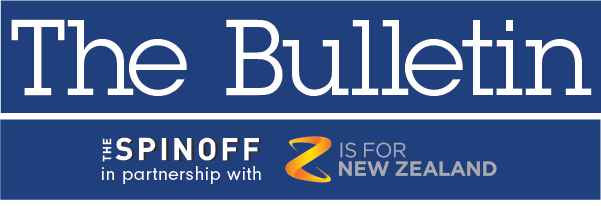Covid 19's rapid spread starts to have serious economic impact
Recession fears gathering as Air NZ announces significant profit downgrade and the impact on NZ's economy estimated at $50m per week.

Good morning and welcome to The Bulletin for Tuesday 25 February, authored by Duncan Greive.
Presented by The Spinoff in partnership with Z Energy.
In today’s edition: Coronavirus’ harsh impact on New Zealand’s economy starts to reveal itself; Bridges advocates matching Australia’s deportation policies and the Shelly Bay dispute ratchets up.

As major outbreaks were confirmed in Iran and Italy, the impact of Coronavirus on New Zealand’s economy started to become more clear, with the NZX50 dropping nearly 2% and Air New Zealand flagging a $35m-$75m hit to earnings in a pre-market opening announcement yesterday. Newshub is reporting our economy as losing $50m per week. The Herald’s Liam Dann has a good (paywalled) primer on the global economic ramifications, saying major credit ratings agencies are beginning to downgrade estimates for global growth, with S&P forecasting nearly a percent lost for China, which remains at just 50%-60% of manufacturing capacity, according to Bloomberg.
Newshub led its 6pm broadcast with the government warning of a “global tipping point”. Jacinda Ardern announced an eight day extension to the travel ban with mainland China, a situation which is straining relations with our universities. Morning Report quoted Victoria University as pleading for a reopening, saying “there is no doubt, based on evidence, that this can be managed”. So far the government is sympathetic but unmoved. In fact, restrictions might head the other way, with Air NZ yesterday announcing it had suspended flights to virus-hit South Korea until June.
Eerie images from Italy showed an Armani show at Milan Fashion Week taking place in an empty hall, and its rapid escalation there without a known patient zero put the focus on New Zealand’s preparedness for an outbreak. This Stuff story summarises government measures to deal with the virus should it arrive, with 18m masks, testing in three cities and a dedicated health phone service for those who are self-isolating. "To the best of my knowledge, we may be one of the only countries in the world running a regime like that,” Jacinda Ardern told a post-cabinet press conference.
National leader Simon Bridges yesterday announced his party is considering retaliatory law changes to match Australia’s deportation policy toward New Zealanders convicted of certain crimes. "In principle, if it’s right for Australia, it's worth exploring whether it's also the right position for New Zealand and our interests," TVNZ reported Bridges as saying, a position Jacinda Ardern later called ‘naive’.
For an in-depth look at the tragic human toll of the policy, it’s worth reading Don Rowe’s extraordinary 2018 feature on one deportee’s experience, and asking whether that’s a door we want to open.
We interrupt this Bulletin to bring you a brief message from Toby Manhire, The Spinoff editor, about The Spinoff Members: If you value the work we do at The Spinoff, the best thing you could do to help us survive the maelstrom engulfing the global media is become a Spinoff member. Contributions allow us to keep making homegrown, NZ-owned and independent journalism that’s free to all. If you do sign up, you can contribute any amount you like, but give $8 a month or more and you’ll get a free copy of a Spinoff tea towel designed by Toby Morris.
MBIE has opened registration for New Zealand’s first 5G auction, reports Chris Keall for the NZ Herald. The technology is integral to a host of futuristic applications, including driverless cars and smart cities, yet the government is intentionally avoiding the kind of windfall it received when 4G was auctioned in 2009, when it took in more than ten times its initial reserve. “Communications Minister Kris Faafoi has backed boosting competition with bidding-limits over maximising the return to the Crown,” writes Keall, suggesting it’s wanting more operators in the market, potentially offering different kinds of service.
The dispute over Shelly Bay in Wellington, which pitches Sir Peter Jackson and the mayor he backed in the 2019 elections, Andy Foster, against property developer Ian Cassels and mana whenua over a $500m housing development, is heating up again. Stuff reports that should the it go ahead Jackson has signalled his willingness to take the fight to the high court – despite the fact the development is already consented. It puts Council in a bind: “If they go the Jackson-route they could be sued by developers, including mana whenua,” Tom Hunt writes. “If they go against Jackson they could end up in the High Court against him.” Having already successfully challenged a popular mayor in Justin Lester over the development, it seems Jackson’s not done yet.
The period of relatively flat house price sales and price rises might be coming to an end, reports Interest, pointing to a “16% increase in the number of properties auctioned this year compared to the equivalent [period]… Of more significance was the number of properties that sold, with sales achieved on 198 properties this year, up 57%”. The Herald led last evening with news of the sale of a 70sq m, two bedroom unit in Takapuna selling for $1.4m, nearly 50% above its CV.
Two markedly different explanations for the persistent rise in house prices played out over the weekend, continuing one of the longest-running and most confounding debates in this country’s history. Former National finance minister Steven Joyce wrote for Stuff, dismissing UN calls for rent freezes and capital gains tax and citing land availability as at the core of the problem. “The premier case study on land availability is post-earthquake Christchurch,” he wrote, praising the decision to unlock 30 years of land at once as causing its oasis of lower house prices than the rest of the country.
Simon Wilson, writing in the Herald, had a very different (paywalled) explanation – a single graph showing the collapse in government spending allocated to housing at the bottom quartile of value. It essentially stops in 1992, and has barely recovered since. Both explanations seem compelling. And yet, as evidenced above, nothing any government does seems to restrain house price inflation.

Right now on The Spinoff: Scott Hamilton recounts the sad history of religion-based racist mysticism in the Waikato. Our excellent intern Felix Walton has a cheat sheet on the new vaping law. Toby Manhire covers a scam website, promoted using Google ads, bringing Mike Hosking and Duncan Garner together, finally. Josie Adams profiles Marlin’s Dreaming, a band creating a new Dunedin pop which both transgresses and embraces certain Flying Nun-era norms. Tara Ward talks to the woman behind the iconic consumer rights show Fair Go. And the Bulletin’s beloved Alex Braae spoke to the undeniable local legend who created Everybody Eats, a charity attacking both food waste and food poverty.
For a feature today, I’m returning to my favourite saga of 2019: the rise and fall of WeWork, which went from the next big IPO to a hospital case in a matter of months, largely (it seemed to me), because of merciless coverage on the Pivot podcast – a twice-weekly examination of politics and tech I can’t recommend highly enough. But the story of the investors behind WeWork is nearly as good.
It concerns Softbank, a Japanese conglomerate, and its enigmatic founder Masayoshi Son. BusinessWeek covered its Vision Fund late last year, showing how one wildly successful bet (a very early investment in Alibaba) has given Son a license to make a lot of far bigger and stranger bets – including a US$375m investment in robot pizza, which somehow went wrong. Here’s an excerpt:
“No one “wants to pick a fight with a crazy guy,” Son told Bloomberg Businessweek last year.
Many SoftBank-backed founders have Masa stories. These often begin with a summons to the 26th floor of SoftBank’s green-tinted glass headquarters in Tokyo or to Son’s home in Woodside, Calif., a 74-acre compound whose massive main residence features a foyer with a large marble statue of a horse and chariot. The entrepreneur might then sit across a table from Son, answer a few questions, hear that their idea is even more promising than they thought, and, by the end of the conversation, be anointed “the next Jack Ma.”
“You feel enabled, you feel euphoric,” says a chief executive officer in Asia. “You’ve been told no a hundred times, and then he says he believes in you. Every entrepreneur dreams of having that kind of backing.”
One Silicon Valley CEO recalls an early pitch meeting with Son over video chat. Unbeknownst to the CEO, the feed to Tokyo fell a minute behind the audio, so he was narrating slides SoftBank’s top brass weren’t yet seeing. “They were all superpolite and nodding their heads,” said a person with knowledge of the meeting, who wasn’t authorised to discuss it. “I didn’t find out until after that none of it made any sense.” The fund ultimately invested in the late-stage startup.”
I took advantage of an afternoon off due to my early start on the Bulletin to listen to the final overs of the Black Caps thrashing of India – the world’s top ranked test side, remember – at the Basin Reserve. Tim Southee further cemented his all-time great status in taking nine wickets in the match, and helped bowl India out for less than 200, leading to a thumping 10 wicket win.
With all due respect to the Ardie Savea floating the idea of a move to league, the most interesting rugby story was a long way from any field, with the Financial Times reporting (syndicated by the Herald, part of its excellent series of added value content for premium subscribers) that CVC, a giant private equity firm, are taking a sizeable stake in the Six Nations tournament. This is part of a series of positions they have taken which indicate a slow takeover of global rugby, with a strategy so comprehensive New Zealand might have no choice but to join in (and Sky to tremble at).
“One plan under consideration is to bundle TV rights for rugby competitions around the world into a single package for broadcasters. CVC is also exploring streaming deals to digital players such as Amazon and the creation of an "over the top" internet subscription service for fans, people familiar with the plans said.”
That's it for The Bulletin. If you want to support the work we do at The Spinoff, please check out our membership programme.




